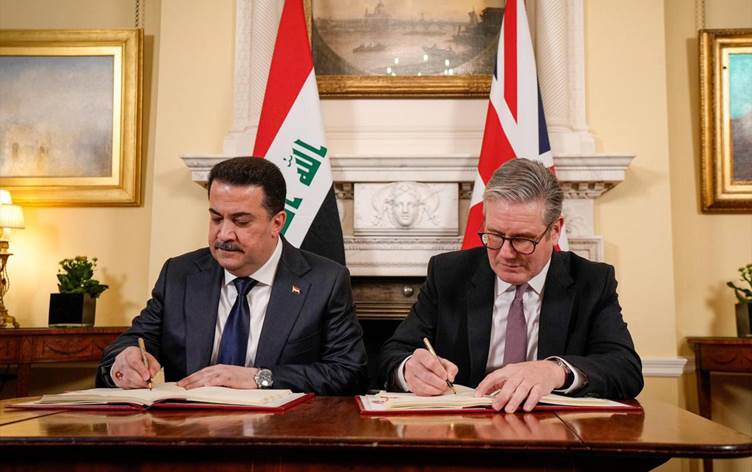
ERBIL, Kurdistan Region – Iraqi Prime Minister Mohammed Shia’ al-Sudani secured a £12.3 billion ($15 billion) trade package in London during a meeting with his British counterpart Keir Starmer on Tuesday, signing key deals in a vast range of fields including security, economy, and migration.
“The leaders reaffirmed their commitment to the vision of a prosperous, sovereign Iraq through a new partnership focused on trade and investment, deepening educational and cultural ties, as well as tackling security, migration, and climate change challenges,” said a joint statement from both prime ministers after their meeting.
A landmark trade and export package worth £12.3 billion was among the deals signed, which is over ten times the total value of UK-Iraq bilateral trade last year.
Sudani is leading an Iraqi delegation to the UK on an official invitation from Starmer, with Baghdad and London enjoying good ties. The delegation includes ministers, members of parliament, the governor of Basra, advisors, representatives from the private sector, and business leaders from various industries.
In an interview with BBC, Sudani hailed the visit as a “new era” in bilateral relations.
“They agreed to utilise UK private sector expertise on critical water, energy, telecoms, and defense infrastructure, and to secure future investment projects in the clean energy, pharmaceutical, logistics, and financial services sector,” the statement continued.
The projects include the reconstruction of the al-Qayyarah airbase, demining efforts, water projects, a new railway, electricity enhancement and connection, and the establishment of a 5G network in Iraq by British telecommunications giant Vodafone.
Both prime ministers also reflected on the progress made by the US-led coalition against the Islamic State (ISIS) in Iraq, with Sudani’s government keen to expel coalition troops and end their military presence in the country.
“The Prime Ministers signed the Joint Statement on the Strategic Bilateral Defence Relationship that establishes the basis for a new era in security cooperation and paves the way for a new agreement to reflect the ambition of both countries. This deepens our defence cooperation for the future,” the statement said.
Baghdad and London agreed to bolster cooperation in tackling migration, with tens of thousands of Iraqis and Kurds taking perilous routes out of the country towards Europe on a yearly basis to escape corruption, political instability, and a lack of employment.
Many of these migrants have Britain as their final destination.
Sudani and Starmer further discussed climate and environmental issues.
“The Prime Ministers welcomed the Government of Iraq’s commitment to end flaring of associated gas by 2028, as part of its transition towards a cleaner energy system, and dry gas venting, that has negative environmental and economic consequences” the statement noted.
Iraq is among the countries most vulnerable to the effects of climate change, including water and food insecurity, according to the United Nations. It is facing a severe water shortage because of reduced precipitation, higher temperatures, and waste and mismanagement.
The flaring process is when oil wells burn the excess gas they cannot store or use, and is considered a convenient way to deal with the waste product known as associated petroleum gas. The process, however, is among the main reasons for global climate change.
Iraq is notorious for the deadly and toxic practice of gas flaring. It is second only to Russia in terms of the amount of gas burned off, though the Iraqi population lives on average much closer to the flaring sites than Russians do.
“Our government has succeeded in raising the gas utilization rate to 67 percent, and we aim to achieve zero gas flaring by 2028 after completing related projects,” Sudani told BBC. “For the first time, Iraq has a clear vision of harnessing associated gas.”
The Iraqi premier later met with British Foreign Secretary David Lammy, signing a memorandum of cooperation on climate change and environmental issues, which included a five-year roadmap to slash Iraq’s carbon footprint.
“The agreement aims to deepen collaboration in promoting sustainable energy reliance while enhancing opportunities for development, trade, investment, and related industrial integration,” a statement from Sudani’s office said.
Iraq and the UK share strong relations. The two countries signed a Strategic Partnership in 2021 to increase cooperation in the economy, education, military and security, and other sectors.

